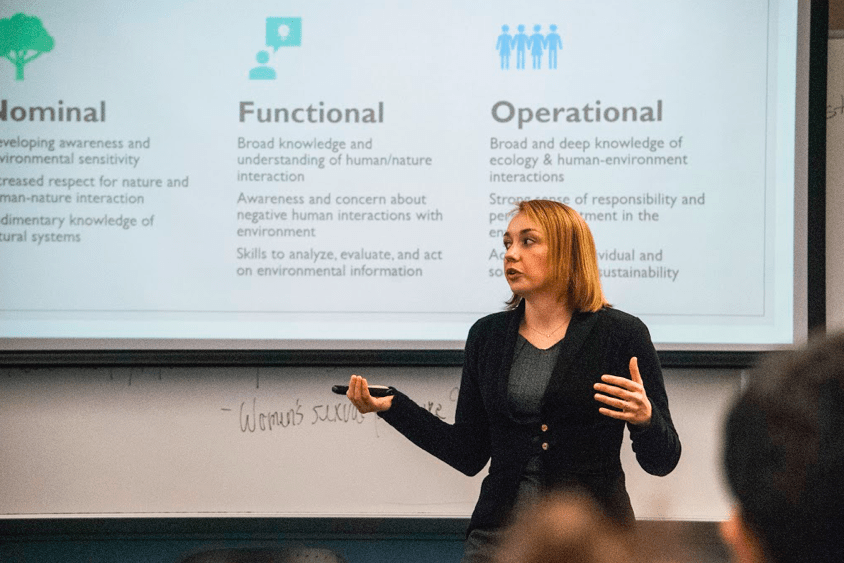Assistant Professor Emily Pechar Diamond, Ph.D., lectures on the interplay between politics and climate change. Photo by James Singer.
In a world where partisan politics impact seemingly every aspect of life, Emily Pechar Diamond, Ph.D., works to discover how communication between political parties influence policy-making decisions surrounding climate change.
Diamond is an assistant professor of communications studies and marine affairs at the University of Rhode Island. She graduated from Georgia Tech in 2010 with a degree in International Affairs and Modern Languages. During her studies, Diamond developed interests in environmental policy and climate change from a college group project.
“When I was an undergrad, I did a big semester-long project on climate change [where] our goal was to reduce the most amount of carbon that we could whether personally or through changes that we get other people to do,” Diamond said.
After college, Diamond worked as a communications consultant which influenced her research and techniques in teaching communication concepts.
“I went into business consulting for a little while,” Diamond said. “I worked at Deloitte Consulting doing strategic communications and change management. We were helping companies that were undergoing a big change in order to communicate that change to their employees and stakeholders.”
From this work experience, Diamond began to pursue her investigative research regarding how communication and partisan identities affect environmental issue opinions.
“I got really interested in this idea of how we communicate about these environmental issues and how the way that we communicate can change people’s attitudes on the issues.” said Diamond.
After taking on these positions, she studied for a doctorate in Environmental Policy at Duke University where she taught courses related to climate change.
“I went to Duke to study this bigger question and I was really interested in it from a political and policy perspective,” said Diamond. “Environmental issues, especially climate change, which has been the primary focus of my research are really highly politicized. Attitudes on them are very closely aligned with people’s partisan identities, whether you are a democrat or a republican.”
One of Diamond’s self-proclaimed teaching achievements was related to her United Nations climate change negotiations practicum course which she taught at Duke from 2014 to 2016.
“The way we designed that course, students studied the United Nations for several months in the class and then we all attended the negotiations,” said Diamond. “I took students to Lima, Peru, Paris, Warsaw and they were actually able to participate in the U.N. climate change negotiations.”
Diamond plans on incorporating her research into the classroom in order to bridge the gap between the two majors.
“I am going to be teaching a graduate course in the fall on Environment and Media,” Diamond said. “Another research project that I want to look at is understanding how the tone of articles about climate change in the media influence people’s attitudes towards the issues.”
One class that Diamond teaches that bridges this gap between the majors is Communication for Marine Affairs. Sophomore marine affairs and political science major Athena Vieria learned valuable communication skills for her future career choices in this course.
“Dr. Diamond helps students develop life-long skills in communication that any student can use no matter what your major is,” Vieria said. “Taking Communication for Marine Affairs helped me develop career skills that I can use after college.”
Upon observation of environmental policies, Diamond is currently writing a paper about a proposed policy that she supports, known as the Green New Deal.
“The Green New Deal unites both an economic development policy with an environmental climate change policy,” said Diamond. “A colleague and I ran an experiment over the summer that looks at how different ways of framing this policy and the different sources of the information affect people’s level of support for the policy.”

